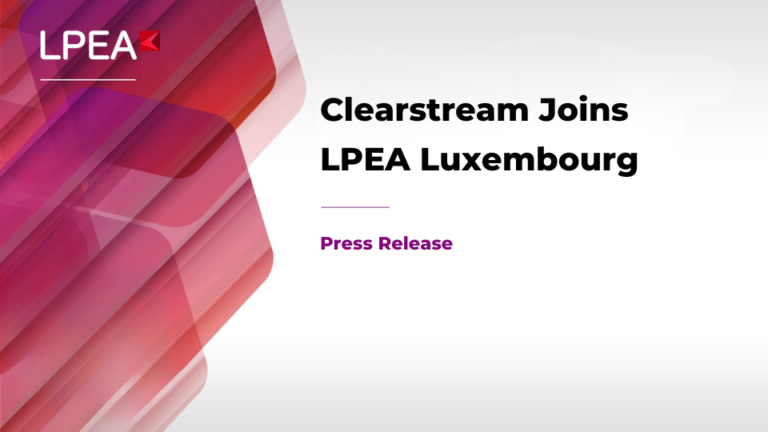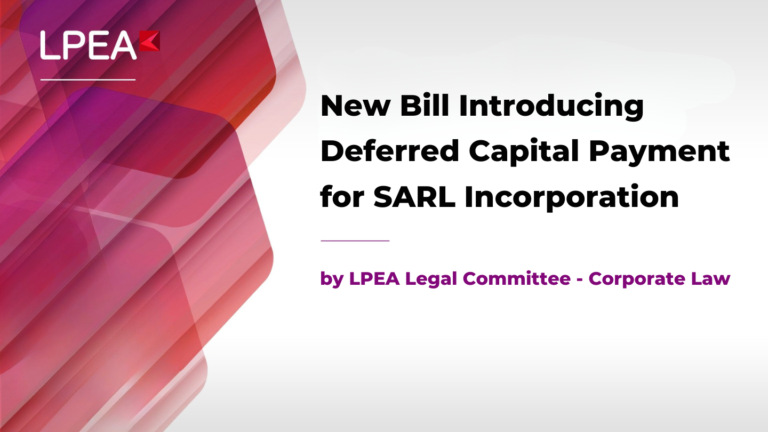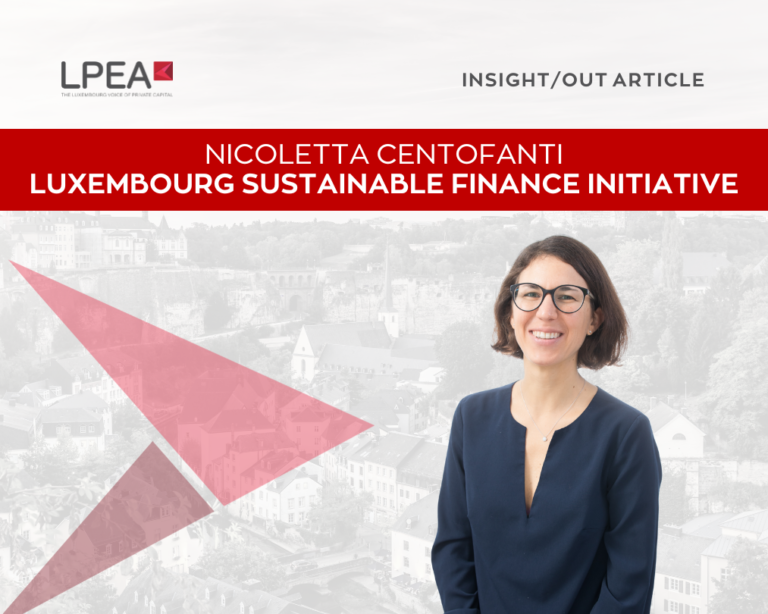Debaters:
Speaking for depositaries
– Sandrine AUBRION, Head FCC at CACEIS Investor Services Bank
– Sandrine LABRO, CCO at BBH Luxembourg
– Regis VINCEY, CCO at Northern Trust Global Services SE
Speaking for Management Companies
– Thomas LANIGRA , Compliance Manager at EQT Fund Management S.à r.l.
– Andrea DE CILLIA, AML Officer at BLACKSTONE Luxembourg
Speaking for the entity hosting the event
– Raphael EBER, Partner at BDO Luxembourg
Moderators:
– Sylvain AUBRY, ALCO Board Member & MUFG Investor Services
– Stephanie CASTRYCK , LPEA AML Technical Committee & HACA Partners
SUMMARY OF THE DISCUSSIONS
On 27th June 2023, ALCO and LPEA organised a roundtable discussion on AML on assets, the idea was to discuss, and exchange point of views between AML/CFT compliance officers working in management companies / AIFMs and representatives of various depositary banks.
Depositaries, as the custodians of assets, play a vital role in safeguarding the assets and ensuring compliance with relevant regulations. They are responsible for holding and monitoring the assets of funds, performing due diligence on their clients’ transactions, and reporting any suspicious activities and /or transactions to the relevant authorities.
Depositaries also have access to critical information about the assets and their movement, hence may identify any potential AML/ CFT/ Sanction risks post trade/ transactions. It is worth mentioning that both parties are subject to AML/CTF obligations.
On the other hand, management companies are responsible for the overall management and administration of investment funds and may also act as portfolio manager. They have in-depth knowledge of the funds’ investment strategies, client profiles, and investor activities.
The collaboration between depositaries and Mancos/ AIFMs on AML may involve sharing fund transaction/ deal information and regular communication to assess and mitigate their respective AML risks effectively. By working together, they can create a more comprehensive and integrated approach to AML compliance.
ALCO and LPEA are thanking their members for the fruitful exchanges and BDO who hosted the event on that day. The debates focused mainly on asset AML related to real estate and private equity strategies.
As introduction, debaters were asked to explain their own obligations and liabilities in performing AML controls on assets.
Unanimously, the debaters agreed that each party ( including the Fund itself depending on the structure) shall comply with the applicable its respective AML Regulations and Standards and which is commensurate to its money laundering and terrorist financing (“ML/TF”) risk appetite and risk assessment. Any practical arrangements for the performance of such obligations must be formalized in writing with details on the respective roles and responsibilities of the third parties involved to ensure compliance with its obligation. They also agreed that the AIFMs the entity primary responsible to perform all due diligence on assets for the investments to be made by the fund under management during the whole life cycle on a pre-trade, ongoing and at the disposal basis and during the life of the investment even if depositaries may have their own obligations and may often be in the situation where they may run some checks post transactions unless they are notified of a coming transaction pre-closure .
But who is doing what, what can be leveraged, how the depositary can complete their duties, is it possible to get comfort from the management company and to which extent?
The AML risk appetite
Before going through the technical details, the debaters engaged in one key aspect, the misalignment or the alignment regarding the Fund’s AML Risk Appetite. Indeed the fund, through its management company and the depositary should initially define their own AML risk appetite which would determine the type of business/ activities/ countries they are willing to invest in, and the level of AML/CFT / Sanction risks they are ready to accept.
When speaking about “other or real assets” (private equity or real estate for example), it can be assumed there will be differences between funds, management companies and depositaries ’risk appetite, from the type of assets they are ready to accept to the geographical/ industry criteria which may differ.
One depositary might accept to onboard funds investing in real estate in the USA but not in Mexico for instance, you can easily imagine that if the onboarded fund is willing to invest in real estate in Mexico there might be some difficulties.
Hence all parts in the discussion agreed that a discussion should take place before the Fund onboarding to make sure that the depositary and the fund / management company are aligned from an AML Risk Appetite perspective in relation to other assets.
In case of differences, there would be different options for the depositary:
– Refusal of the mandate
– Going through an exception approval, that may imply an operational development to mitigate the depositary from more AML risks than they are willing to take in line with their respective risk appetite.
One proposal was made to establish a document that will be filled out by both parts to identify any AML Risk Appetite Gaps. ALCO and LPEA will consider drafting such a document to propose it to its members.
Should discrepancies be identified and should the depositary still accept the mandate it was reminded that the deviation (to the AML Risk Appetite ) must be documented and validated at the proper level of governance of the Companies Some depositary explained that they have a dedicated AML committee that would deal with such matters.
The AML due diligence
As mentioned, the first entity to perform the due diligence will be the fund through its management company / AIFM (or the entity in charge of the portfolio management if such function is delegated), they will conduct the AML due diligence on a risk based approach and will expand the work when the assets is rated high risk. It was reminded that the other assets shall be risk rated from an AML perspective considering different criteria such as, but not limited to, the country, the type of assets and for instance the type of sectors.
When the fund is performing its due diligence ahead of closing an investment , some participants disclosed that they are issuing an AML comfort letter to their depositary which gives details on the due diligence performed, the type of investment and the expected transactions.
A due diligence pack is often prepared by the management company / AIFM for the depositary, given the depositary must also obtain all legal documentation to satisfy their duty of ownership verification, and usually encompasses :
– an “investment memo” which details the contemplated transaction before validation by the relevant governance instance and mentions the due diligence performed, the screening of all related parties, the documents that can be sent upon request, etc..
– An AML comfort letter
– Any relevant documents upon request
As part of the debate there was discussion about having the documentation stored in the cloud and that access would be granted to auditors and depositaries. This could be done but taking into consideration data protection and cloud outsourcing aspects.
Depositaries are mentioning that to perform their duties and they must have access to any relevant documentation a but should also perform their independent due diligence including (1) screening before executing any transaction request by its client as to ensure that the transaction does not expose the depositary to unwanted risk(s) (in particular from an economic sanctions perspective)and (2) daily name screening post transaction. In case of a material true hit, depositaries need to escalate it to the Fund/ Manco’s RC. On the other side the Fund / AIFM may also escalate any issue detected proactively to the depositary .
The initial due diligence is one aspect of the process, but there is further consideration to be addressed related to the ongoing due diligence which will have to be carried out on a risk based approach and includes documentation updates (where needed) and ongoing screening.
The depositary shall also conduct a due diligence on the fund and should obtain information about the way the fund and its management company / AIFM performs the AML due diligence on assets.
The ongoing due diligence also include transaction monitoring which would be performed at the depositary level especially when the latter is handling the cash accounts of the fund. It was debated how should that work in case where the depositary is not a bank and where the cash account is held with a third party (bank).From a fund perspective it seems there is no major difference in this setup with the full fledge setup, if all parties have clear agreement and share information adequately.
The debate was then moving to the selling stage. This is an important step in terms of AML on assets. The fund must perform a due diligence on the entity that will buy the asset. The debate focused on the data to be shared with the depositary and at what stage The buyer information must be shared with the depositary as soon as possible. The debaters explored the hypothetical case in which the depositary would not be comfortable with the buyer whereas the fund and its management company / AIFM would be.
The question that arose was if it would be possible for the depositary to ask the fund to refuse to signing the share and purchase agreement.
The debaters agreed that this is a complex situation as, on one side the depositary is not a party on the share and purchase agreement and on the other side, it cannot accept funds from parties where there is a doubt from an AML perspective
This case never occurred within the debaters but should the case occurs, a detailed assessment should be performed with more investigations..
In conclusion and despite the different processes in place on each side, there is a common objective to strengthen or improve the transparency between the management companies /AIFMs and the depositaries.
Some ideas have been shared between the debaters such as drafting a common template of risk appetite and a common AML letter or implementing a dedicated platform to facilitate the submission of the documentation to be shared.
The cooperation between depositaries and management companies / AIFMs on Anti-Money Laundering (AML)/ CFT/ Sanction compliance for assets is crucial in ensuring the integrity and security of the financial system in Luxembourg and smooth the onboarding of new alternative investment funds from an operational aspect.
LPEA and ALCO, as professional associations, would be thrilled to contribute and be part of this potential new project.




